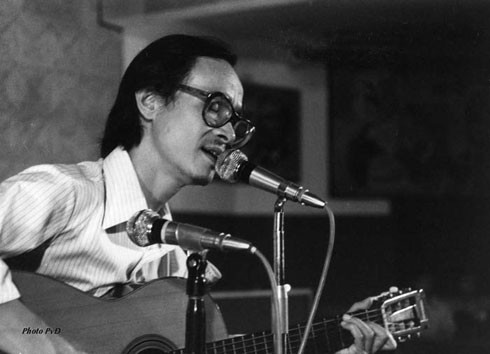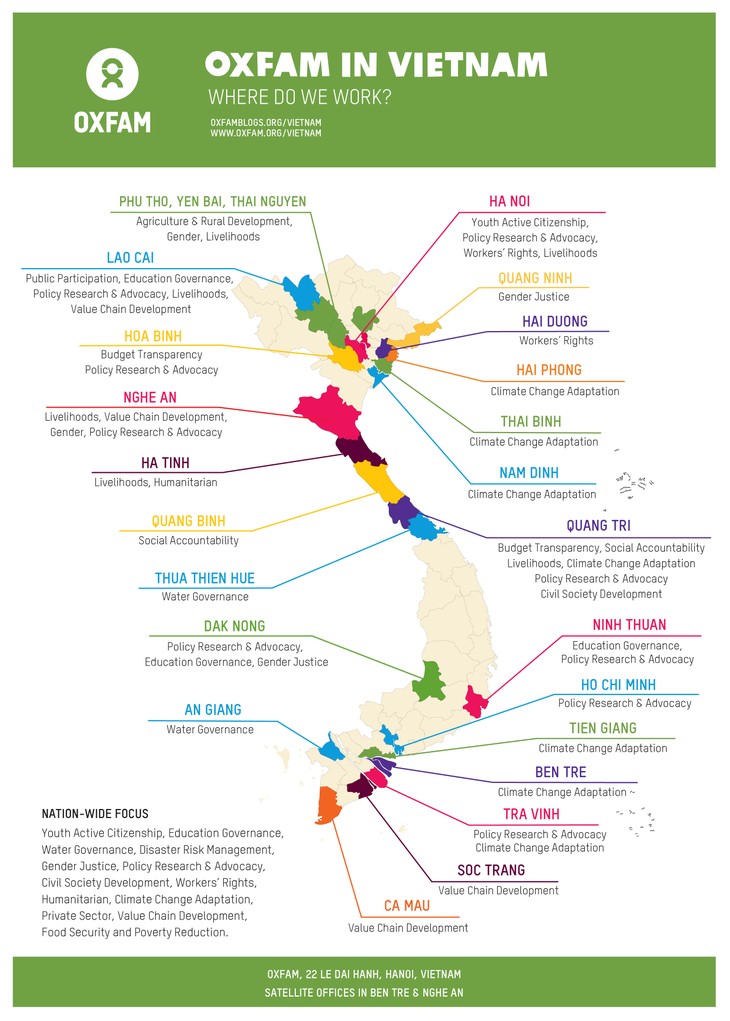B: Yes, the Letter Box segment is our favorite time, when we get to read listeners’ letters. Your comments, compliments, and stories about your lives and your countries are very interesting to us. I’m reading an email from Paul B. Walker of Warren, Pennsylvania, in the US. “I am enjoying being in a region where regular, quality reception of The Voice of Vietnam is possible on a regular basis. I enjoyed the song at the end of your show. Using the SoundHound app on my IPhone 7plus, I identified the song as "Toi Ru Em Ngu". It sounded like a group of male singers, and it sounded like they were singing acappella, without instrumental accompaniment.
A: You got it, Paul. It’s the song “Toi ru em ngu”, which means “I lull you to sleep”, by the late Trinh Cong Son. Technology is amazing. It can immediately give you an answer so you don’t need to ask the VOV staff what the song was.
B: Well, that doesn’t mean we’re redundant. Out of Son’s huge song collection, we’ve selected some of the best ones to introduce to our foreign listeners. Son wrote over 500 songs about war, love, and life. Many Vietnamese consider Son the Bob Dylan of Vietnam. His melancholy songs about love and life earned him enormous popularity.
A: Love is the single biggest recurring theme in Trinh's work. Most of the time it’s sad love, carrying a sense of despondency, loneliness, and loss and conveying philosophical messages from a man to the woman he loves. The lyrics are poetic, frankly candid but deeply poignant, oftentimes suggesting deeper symbolism and a sense of surrealism.
 Musician Trinh Cong Son Musician Trinh Cong Son
|
B: Paul, thank you for saying “I love getting mail from VOV almost as much as I love listening to your music, I especially love older songs.” We’ll confirm your report with a QSL card. We hope you’ve collected all our QSL designs with images of Long Bien bridge, built by the French in 1899, Ly Son island, peach blossoms in Moc Chau, terraced rice fields in Sapa, the Hoai river in Hoi An, Ban Gioc waterfall in Lang Son province, Thuan Phuoc bridge in Danang city, and a photo of the female staff here in the English section.
 Singer Hong Nhung is praised as the best singer singing Son's songs Singer Hong Nhung is praised as the best singer singing Son's songs
|
A: Indian listener S.Sharma listens to our program and sends us reception reports every day. He often has interesting questions about Vietnam after listening to our program. This week he asks how many registered NGOs are presently working in Vietnam and what is the role of NGOs in Vietnam.
B:After 1975, international non-governmental organizations stopped their activities in southern Vietnam to establish official relations with the Vietnamese government. In 1978 about 70 NGOs operated in Vietnam to help Vietnam resolve the aftermath of war and provide food and medicines worth 30 million USD per year.
A: Beginning in 1986, Vietnam’s “open door policy” invited and supported NGO operations in Vietnam. Around 100 NGOs came. The number has increased rapidly: 210 NGOs in 1994,650 in 2006, and 800 in 2010. More than half of them carried out regular activities and partnered with Vietnam’s government agencies and social organizations. Their programs have been implemented in all provinces and cities, mostly in poor and remote areas.
 Oxfam is an active NGO with various activities across Vietnam Oxfam is an active NGO with various activities across Vietnam
|
B: They have supported the government’s social programs and development priorities, including poverty reduction, sustainable development, healthcare, education, and technology acquisition. Besides providing financial and technical support, their partnership with Vietnam has helped people around the world learn more about Vietnam and has expanded people-to-people exchanges.
A: Now let’s continue with letters from other listeners. This week we’ve received some positive remarks about transmission quality. Eddy Prabowo of Indonesia tuned into our program on April 22 on the frequency of7315 kHz. Eddy said he logged in via webSDR in New Jersey, USA and monitored in Jakarta, Indonesia, using a Xiaomi Redmi2 Android smart phone. He rated SINPO55455. He remarked, “Excellent signal strength came in with relatively stable quality and clear reception. Only found a minor atmospheric noise splatter.”
B: From Canada Richard Lemke emailed us to say that on April 21he received in the mail a VOV gift dated December 12, 2016 – a Year of the Rooster scroll-type wall calendar for 2017.
A: I don’t know whether that’s good news or bad news. It took 5 months for a post from Vietnam to reach you in Canada. But at least you got it and can use it for 7 months. This year maybe we should send your New Year greeting cards and gifts a bit earlier.
B: Tore Gunnarsson of Sweden sent a reception report for a broadcast on April 9 on the frequency of 7220 kHz. He used an old “Kungsradio 752” receiver from 1951 with a 20m antenna. SINPO rating was 45444 with a strong, clear signal and just a bit of fading. Tore said he has been interested in DX-ing since 1965. I bet you have collected a lot of QSL cards, Tore. If you send us the oldest QSL card you’ve received from VOV, we’ll send you a special gift as our token of thanks for being a long-term listener.
A: From Pennsylvania inthe US, Bob Nagel reported listening to our program on 7315 kHz and rated SINPO all 4s. He wrote: “I’m always interested in hearing your news programs. I also enjoyed Colorful Vietnam. It was the first time I’ve heard that program.”
B: Our segment “Colorful Vietnam, Vietnam’s 54 ethnic groups” features all aspects of Vietnam’s ethnic groups. A series about one group has about 10 stories, to give readers a deeper understanding of theirtribal lifestyle in the past and the present, plus the group’s traditions, culture, and much more.
A: Andrew Kuznetsov of Latvia listened to VOV on April 17on the frequency of 12020 kHz. He said the signal was very weak with a SINPO rating of 24322. Despite the poor reception, his report matched our station log, so we’ll verify it with a QSL card.
B: Our regular listener in Japan Masaru Sekimoto tuned in to our 12020 kHz frequency on April 23 and rated SINPO 44333. He wrote: “I’m glad to catch your program. I like to listen to the Sunday Show and other programs which tell me about Vietnam’s culture. I’ll try to listen to your program next time.”
A: Thank you all for your feedback. We hope our QSL cards will reach you soon. Please send your reports to English Section, Overseas Service, Voice of Vietnam, 45 Ba Trieu Street, Hanoi, Vietnam. Our email address is englishsection@vov.org.vn. Thank you for listening.Please join us again next Wednesday for another Letter Box edition. Goodbye.